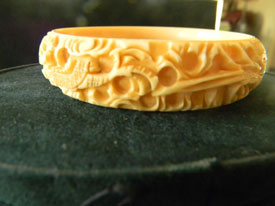From the blog
Things You Can’t Sell (May 18, 2015)
By Dale Smrekar, ASEL, C.A.G.A.

Ever hear of the 1918 Migratory Bird Treaty? The Eagle Protection Act of 1940? Are you aware of Endangered Species laws? Most people have not. But violate any of these obscure laws and you could get fined, be convicted of a felony or even face incarceration. This is what can make estate liquidation by the amateur so perilous. Below I have addressed some of the highlights as to current laws regarding animals and birds. This is just to serve as an overview of these laws. If you have specific questions about issues not covered here, you are advised to contact the US Fish & Wildlife Service or your local State Fish & Wildlife office regarding state laws on what animal or bird items can be sold.
1918 Migratory Bird Treaty Act: This law was actually first enacted in 1916 between the US and Canada to protect the taking of migratory birds. It was expanded in agreements with other countries over the years. The act was first initiated to protect bird populations because of the extensive use of bird feathers in clothing. This practice had wiped out whole populations of birds such as the passenger pigeon. It now covers over 800 bird species, including believe it or not the common turkey buzzard you see on the side of roads. You can own a stuffed bird or bird parts of birds that are commonly hunted like ducks, pheasants, etc. However, you cannot own most other species, which includes all birds of prey. They were included in the Migratory Bird Treaty Act in 1972, so birds obtained before 1972 are frequently found in estates. When that situation occurs it is often best to call the US Fish & Wildlife service and they will come out and take possession. Be aware that if the individual is still living there may be repercussions from the illegal possession of the bird.
The Eagle Protection Act of 1940: This is the big one of animal laws. It is against the law to possess Bald or Golden Eagle parts, feathers or stuffed birds. The only individuals allowed to own these items are American Indians with permits. Museums can be permitted for education purposes to possess these items. It also includes eagle feathers which prohibits the ownership of many American Indian artifacts like war bonnets etc. A felony violation of this act can result in fines up to 250,000 and prison. If you should run across one in the liquidation of an estate you are advised to immediately contact the US Fish and Wildlife Service.
Endangered Species Act of 1973: This law was enacted to protect living species and prohibit the taking of a variety of animals for parts, fur etc. The law as written provides stiff penalties for the possession of endangered species items if they were obtained illegally after December 27, 1973. The items can vary from tortoise shells, to furs, body parts etc. It was not uncommon for women in the 50’s to own cat fur coats so it is not unusual to find these items. It was also common to find the trophies of big game hunting such as fur rugs, animal parts or animal mounts. Should you find these items in an estate, first try to find any documents which indicate date of ownership paperwork. If obtained before December 27, 1973 contact the US Fish & wildlife service to determine if and under what rules you can sell it. For instance a leopard fur purse legally obtained prior to December 27, 1973 can be sold in the state of Florida to another individual who also resides in the state of Florida. It cannot be sold or shipped outside the state. If there are no documents, contact the US Fish and Wildlife Service to have them pick the item up or provide advice as to disposition.
The possession of Ivory: Effective February 25, 2014 a Presidential Executive order banned the sale of Ivory with in the United States. Ownership is allowed and the ivory items as long as legally obtained can be handed down to heirs of an estate, but sale is outlawed. There is an exclusion for antique ivory, but it must either have a CITES (Convention on International Trade in Endangered Species) certificate or other document issues by the US Fish & Wildlife Service allowing sale. The laws as of this date (May 17, 2014) are evolving and there may be some clarification of policy in the next years, however for now all regular Ivory sales are banned.
State animal parts laws: Every state has their own animal parts laws and failure to follow them may result in misdemeanor to felony conviction with significant fines. For instance in Florida you cannot sell Black Bear parts or possess native mink or weasel or Key Vaca raccoon parts. In South Carolina you cannot sell or barter bear parts or deer antlers still attached to the skull or sell wild turkey parts. In Arkansas it is illegal to possess alligator snapping turtle parts. In Kentucky spotted skunk parts may not be sold. The laws are so varied from state to state that owners of any animal items should contact their local State wildlife agency to determine the applicable laws regarding sale.
Dog & Cat Fur: Finally the Dog and Cat Protection Act of 2000 prohibits the sale of dog or cat fur and mounted items. If the estate contains the mounted remains of Fluffy or Fido you cannot sell it.

